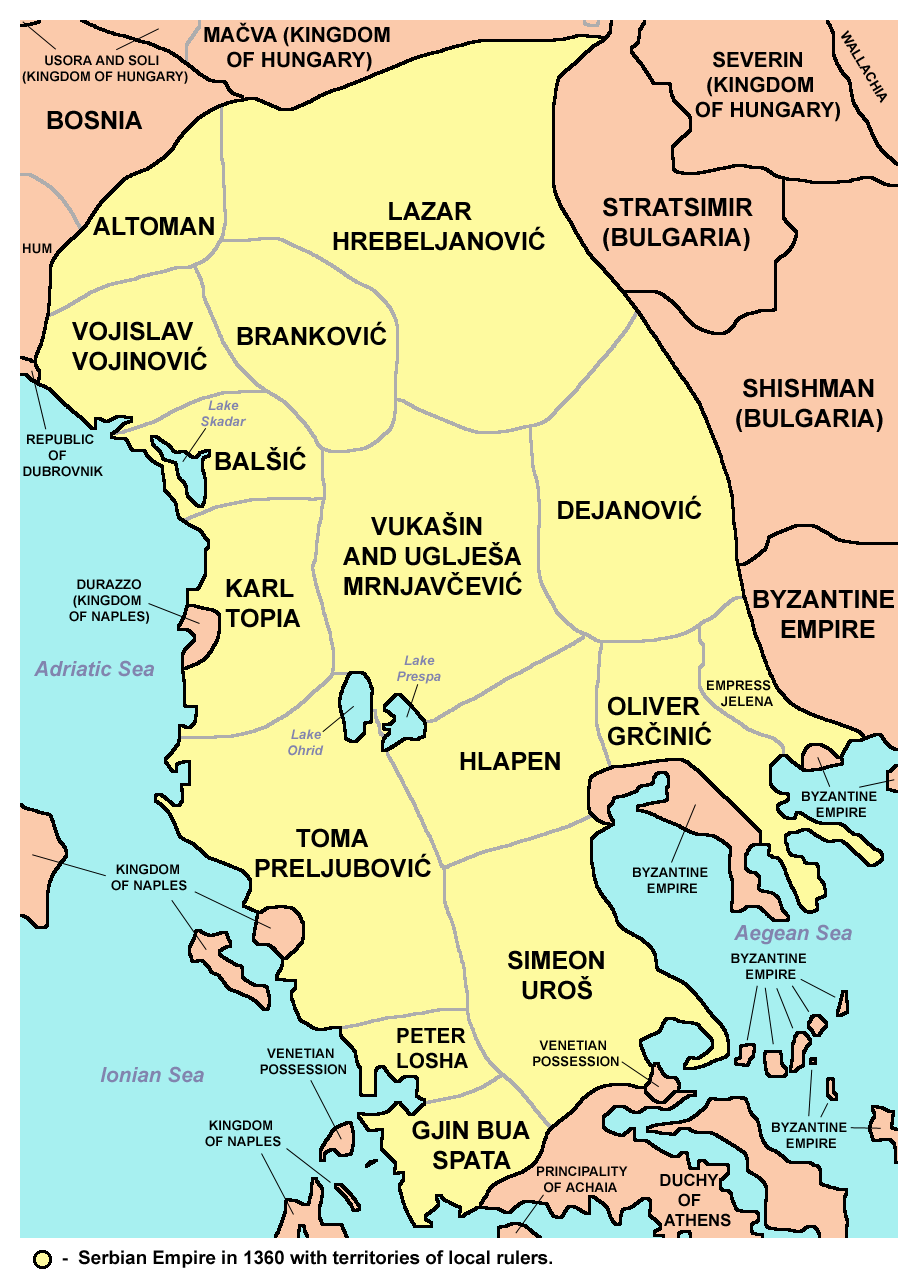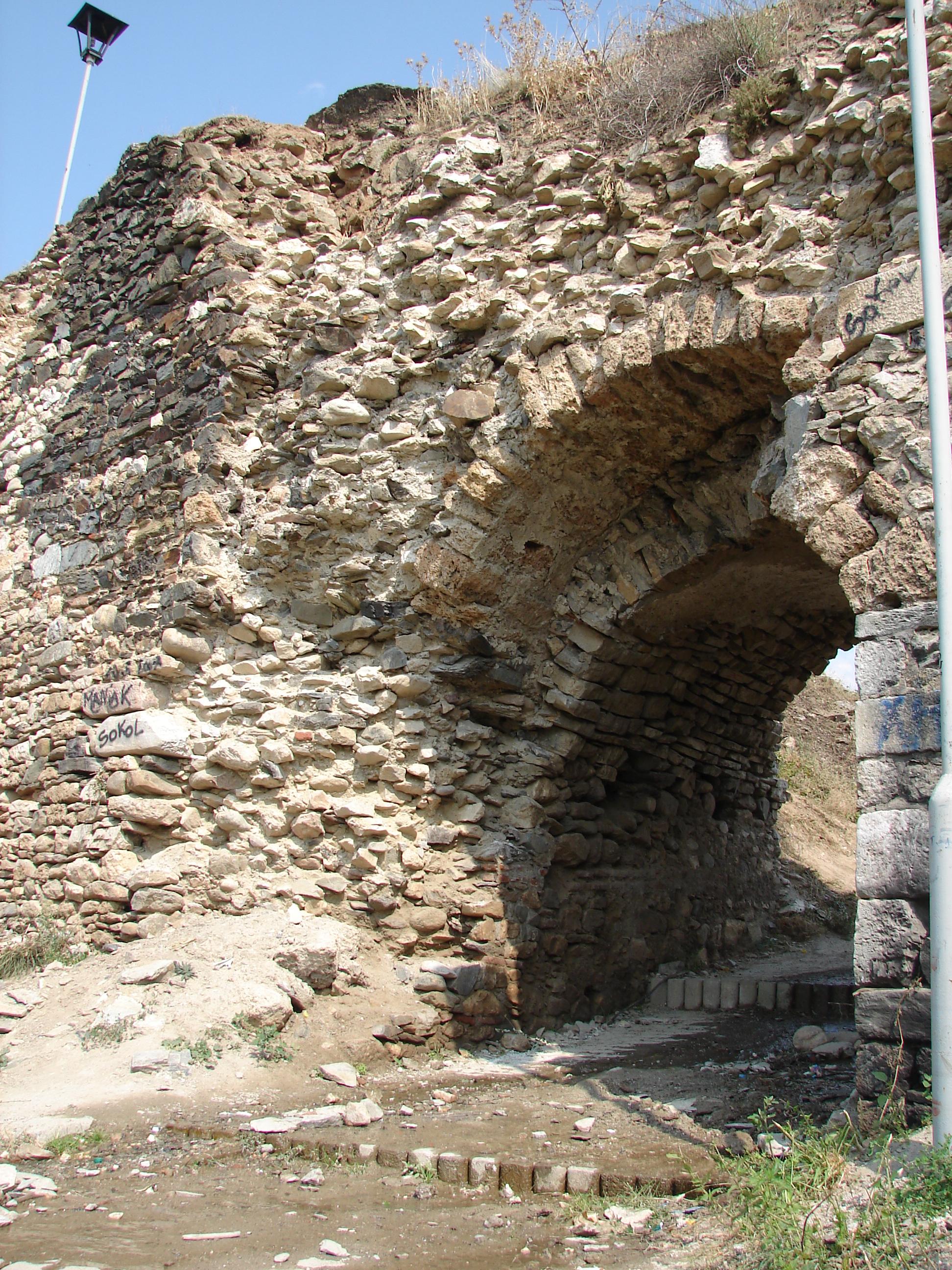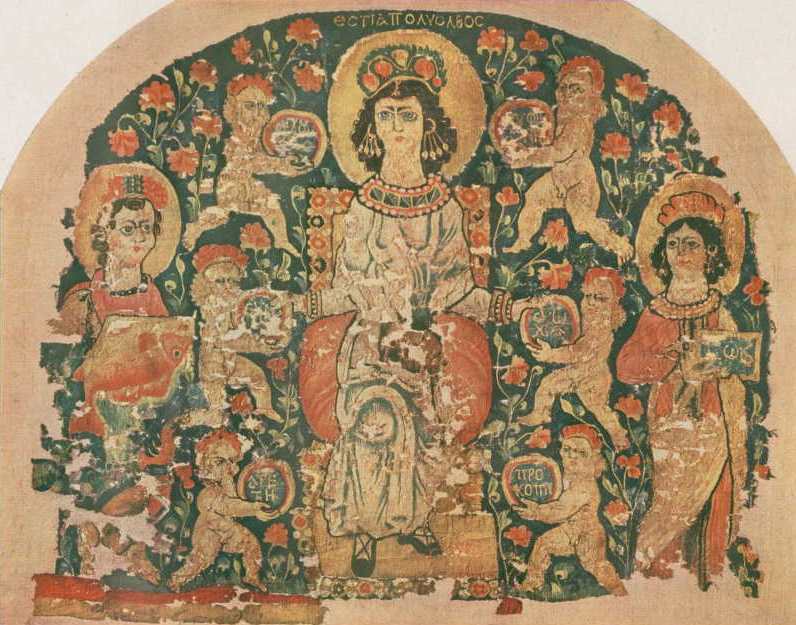|
Pjeter Losha
Pjetër Losha was an Albanian tribes, Albanian clan leader in medieval Epirus. He belonged to the Losha ''fis'' (clan or tribe) and was the leader of a combined force of his own clan and the ''fis'' of Mazaraki and Malakasioi, Malakasi. In 1360, he became Despotate of Arta, Despot of Arta, Rogoi and the area of Amphilochia. He died in 1374 and was succeeded by his close ally, John Spata, Gjin Bua Shpata. The ''Chronicle of the Tocco'' is an important primary source for his life and the Albanians in medieval Epirus in general. Life Losha's genealogy or birth date is unknown. He belonged to the Losha clan, which according to Aristidh Kola, was a branch of Bua (tribe), Bua tribe. Presumably he was born in Epirus as his tribe was from there as well. The word ''lios'' means "pockmark" in Albanian language, Albanian. He was part of the Albanian attacks in the remnants of Byzantine Empire, Byzantine Epirus. In 1358–59, Albanian clans overran the regional feudal rulers and established t ... [...More Info...] [...Related Items...] OR: [Wikipedia] [Google] [Baidu] |
Albanian Tribes
The Albanian tribes () form a historical mode of social organization (''farefisní'') in Albania and the southwestern Balkans characterized by a common culture, often common patrilineal kinship ties and shared social ties. The ''fis'' ( sq-definite, fisi; commonly translated as "tribe", also as "clan" or "kin" community) stands at the center of Albanian organization based on kinship relations, a concept that can be found among southern Albanians also with the term ''farë'' ( sq-definite, fara). Inherited from ancient Illyrian social structures, Albanian tribal society emerged in the early Middle Ages as the dominant form of social organization among Albanians. The development of feudalism came to both antagonize it, and slowly integrate aspects of it in Albanian feudal society, as most noble families themselves came from these tribes and depended on their support. This process stopped after the Ottoman conquest of Albania and the Balkans in the late 15th century and was follow ... [...More Info...] [...Related Items...] OR: [Wikipedia] [Google] [Baidu] |
Arta, Greece
Arta () is a city in northwestern Greece and capital of the Arta (regional unit), regional unit of Arta, which is part of Epirus (region), Epirus region. The city was known in ancient times as Ambracia (). Arta is known for the Bridge of Arta, medieval bridge over the Arachthos River, as well as for its ancient sites from the era of Pyrrhus of Epirus and its well-preserved 13th-century Castle of Arta, castle. Arta's Byzantine history is reflected in its many Byzantine churches; perhaps the best known is the Panagia Paregoretissa (Mother of God the Consoling), built about 1290 by despot (court title), Despot Nikephoros I Komnenos Doukas. Etymology The origin of the city's name is quite uncertain. It is either derived from a corruption of the river Arachthos, or from the Latin word "artus" (narrow), or from the Slavic languages, Slavic word "balta" (swamp). History Antiquity The first settlement in the area of the modern city dates to the 9th century B.C. Ambracia was founded as ... [...More Info...] [...Related Items...] OR: [Wikipedia] [Google] [Baidu] |
People From The Serbian Empire
The term "the people" refers to the public or common mass of people of a polity. As such it is a concept of human rights law, international law as well as constitutional law, particularly used for claims of popular sovereignty. In contrast, a people is any plurality of persons considered as a whole. Used in politics and law, the term "a people" refers to the collective or community of an ethnic group or nation. Concepts Legal Chapter One, Article One of the Charter of the United Nations states that "peoples" have the right to self-determination. Though the mere status as peoples and the right to self-determination, as for example in the case of Indigenous peoples (''peoples'', as in all groups of indigenous people, not merely all indigenous persons as in ''indigenous people''), does not automatically provide for independent sovereignty and therefore secession. Indeed, judge Ivor Jennings identified the inherent problems in the right of "peoples" to self-determination, as ... [...More Info...] [...Related Items...] OR: [Wikipedia] [Google] [Baidu] |
Despots Of Arta ...
Despot may refer to: * Despot (court title), a Byzantine court title * Despotism, a form of government in which power is concentrated in the hands of one individual * Despot (rapper), rapper Alec Reinstein's stage name * ', a TV series * Despot (vehicle), armoured multifunctional vehicle People with the given name * Despot Badžović (1850–1930), teacher, activist of the Serbian national movement People with the surname * Despot (surname) * Blaženka Despot (1930–2001), Croatian philosopher and sociologist * Branko Despot (1942–), Croatian philosopher * Dragan Despot (1956–), Croatian actor * Iacob Heraclid Despot (1527–1563), Prince of Moldavia * Ilija Despot (1885–1970), Croatian poet and writer * Veljko Despot Veljko Despot (born 4 March 1948) is a Croatian music journalist and record business entrepreneur. He has been involved in all aspects of the music industry as manager-director, record label owner, reporter, chief editor, radio and TV program ... [...More Info...] [...Related Items...] OR: [Wikipedia] [Google] [Baidu] |
14th-century Albanian People
The 14th century lasted from 1 January 1301 (represented by the Roman numerals MCCCI) to 31 December 1400 (MCD). It is estimated that the century witnessed the death of more than 45 million lives from political and natural disasters in both Europe and the Mongol Empire. West Africa experienced economic growth and prosperity. In Europe, the Black Death claimed 25 million lives wiping out one third of the European population while the Kingdom of England and the Kingdom of France fought in the protracted Hundred Years' War after the death of King Charles IV of France led to a claim to the French throne by King Edward III of England. This period is considered the height of chivalry and marks the beginning of strong separate identities for both England and France as well as the foundation of the Italian Renaissance and the Ottoman Empire. In Asia, Tamerlane (Timur), established the Timurid Empire, history's third largest empire to have been ever established by a single conqueror ... [...More Info...] [...Related Items...] OR: [Wikipedia] [Google] [Baidu] |
1374 Deaths
Year 1374 ( MCCCLXXIV) was a common year starting on Sunday of the Julian calendar. Events January–December * April 23 – In recognition of his services, Edward III of England grants the English writer Geoffrey Chaucer a gallon of wine a day, for the rest of his life. * June 24 – The illness dancing mania begins in Aix-la-Chapelle (Aachen), possibly due to ergotism. * October 27 – King Gongmin of Goryeo is assassinated and succeeded by U of Goryeo on the throne of Goryeo (in modern-day Korea). * November 25 – James of Baux succeeds his uncle, Philip II, as Prince of Taranto (modern-day eastern Italy) and titular ruler of the Latin Empire (northern Greece and western Turkey). Date unknown * Rao Biram Dev succeeds Rao Kanhadev as ruler of Marwar (the modern-day Jodhpur district of India). * Shaikh Hasan Jalayir succeeds his father, Shaykh Uways Jalayir, as ruler of the Jalayirid Sultanate in modern-day Iraq and western Iran. Hasan p ... [...More Info...] [...Related Items...] OR: [Wikipedia] [Google] [Baidu] |
Gjin Bua Spata
Gjin Bua Shpata (sometimes anglicized as ''John Spata'') ( 1358 – 29 October 1399) was an Albanian ruler in Western Greece with the title of Despot. Together with Pjetër Losha, he led raids into Epirus, Acarnania and Aetolia in 1358. He was recognized as Despot by the titular Eastern Roman Emperor in the early 1360s and ruled Aetolia (1360s–?), Angelokastron (?–1399), Naupactus (1378–1399), and Arta (1370s–1399). He was born sometime in the first half of the 14th century in Epirus, as his father was a ruler in the region. Name The word ''spata'', in Albanian ''shpatë'', pl. ''shpata'', 'sword'. Hammond thus believes that he was called "John the Sword". Spatha being a type of Roman sword. Life Karl Hopf's genealogy of the Shpata family is "altogether inaccurate"; according to it, his father was Pietro, the lord of Angelokastron and Delvina (1354) during the reign of Serbian emperor Stefan Dušan (r. 1331–55). It is known that Shpata had a brother, Skurra ... [...More Info...] [...Related Items...] OR: [Wikipedia] [Google] [Baidu] |
Serbian Empire
The Serbian Empire ( sr-Cyrl-Latn, Српско царство, Srpsko carstvo, separator=" / ", ) was a medieval Serbian state that emerged from the Kingdom of Serbia. It was established in 1346 by Dušan the Mighty, who significantly expanded the state. During Dušan's rule, Serbia was one of the most powerful European states and, the most powerful in Southeast Europe. It was an Eastern Orthodox multi-ethnic and multi-lingual empire that stretched from the Danube in the north to the Gulf of Corinth in the south, with its capital in Skopje. Dušan also promoted the Serbian Archbishopric to the Serbian Patriarchate. In the Serbian Empire, the region of Kosovo was the most prosperous and densely populated area, serving as a key political, religious, and cultural center. Dušan's son and successor, Uroš the Weak, struggled to maintain his father's vast empire, gradually losing much of the conquered territory - hence his epithet. The Serbian Empire effectively ended wit ... [...More Info...] [...Related Items...] OR: [Wikipedia] [Google] [Baidu] |
Dumbarton Oaks
Dumbarton Oaks, formally the Dumbarton Oaks Research Library and Collection, is a historic estate in the Georgetown neighborhood of Washington, D.C. It was the residence and gardens of wealthy U.S. diplomat Robert Woods Bliss and his wife Mildred Barnes Bliss. The estate was founded by the Bliss couple, who gave the home and gardens to Harvard University in 1940. In 1944, it was the site of the Dumbarton Oaks Conference, which developed plans for the founding of the United Nations following World War II. The part of the landscaped portion of the estate that was designed as an enhanced "natural" area, was given to the National Park Service and is now Dumbarton Oaks Park. The research institute that has emerged from the bequest to Harvard is dedicated to supporting scholarship in the fields of Byzantine and Pre-Columbian studies, as well as garden design and landscape architecture through its research fellowships, meetings, exhibitions, and publications. It also opens its g ... [...More Info...] [...Related Items...] OR: [Wikipedia] [Google] [Baidu] |
Filippiada
Filippiada () is a small town and a former municipality in the Preveza regional unit, Epirus, Greece. Since the 2011 local government reform it is part of the municipality Ziros, of which it is a municipal unit. The municipal unit has an area of . It has a population of 8,325 (2021 census). Geography The town of Filippiada is situated at the foot of low hills on the right bank of the river Louros. The northern part of the municipal unit is mountainous. Filippiada is northwest of Arta, northeast of Preveza and south of Ioannina. The Greek National Road 5 (Antirrio - Agrinio - Arta - Ioannina) passes through the town, and the Greek National Road 21 connects it with Preveza. The municipal unit's geographical landscape includes part of the Louros River and Lake Zirou. Filippiada bears the nickname "stork town" () due to the scattered nests of migratory birds frequently found throughout town. History The area of Filippiada has been inhabited since at least the 8th and 7th ce ... [...More Info...] [...Related Items...] OR: [Wikipedia] [Google] [Baidu] |
Toma Preljubović
Toma or TOMA may refer to: Places *Toma, Burkina Faso, a town in Nayala province * Toma Department, a department in Nayala province *Toma, Banwa, Burkina Faso, a town * Tōma, Hokkaidō, Japan, a town **Tōma Station, its railway station *Toma, a town in East New Britain, Papua New Guinea People *Toma (name), list of people with this name *Loma people or Toma, an ethnic group from border region between Guinea and Liberia **Loma language *ToMa, Croatian singer Music and television * ''Toma'' (TV series), an American series * "Toma" (song), by rapper Pitbull *"Toma" (song), by artist Puscifer *"Toma" (song), by artist Ivy Queen Other uses *La Toma, a 1598 assertion of Spanish possession of land north of Rio Grande *Siege of Toma, a military action in 1914 in German New Guinea *Texas Open Meetings Act * Theatre Orchestra Musicians Association (TOMA), part of the Media, Entertainment and Arts Alliance, Australia *Tōma, Kendo term for "long distance" *Toma cheese, Italian cheese *T ... [...More Info...] [...Related Items...] OR: [Wikipedia] [Google] [Baidu] |
Aetolia-Acarnania
Aetolia-Acarnania (, ''Aitoloakarnanía'', ) is one of the regional units of Greece. It is part of the geographic regions of Greece, geographic region of Central Greece (geographic region), Central Greece and the administrative regions of Greece, administrative region of West Greece. A combination of the historical regions of Aetolia and Acarnania, it is the country's largest regional unit. Its capital is Missolonghi for historical reasons, with its biggest city and economic centre at Agrinio. The area is now connected with the Peloponnese peninsula via the Rio–Antirrio bridge, Rio-Antirio Bridge. The surrounding regional units take in Arta (regional unit), Arta in Epirus (region), Epirus, a narrow length bordering Karditsa (regional unit), Karditsa of Thessaly, Evrytania to the northeast, and Phocis to the east. Geography Mountains dominate the north, northeast, west and southeast, especially the Acarnanian Mountains. The longest and main river is the Achelous River, Acheloo ... [...More Info...] [...Related Items...] OR: [Wikipedia] [Google] [Baidu] |







